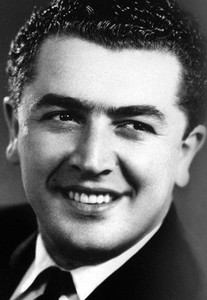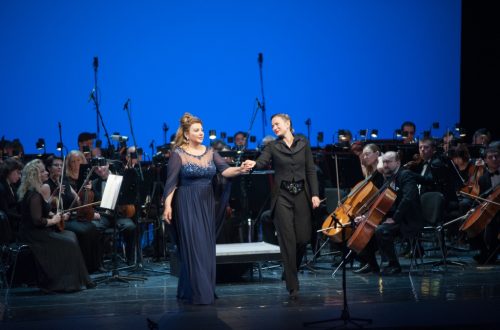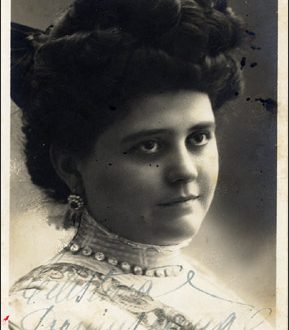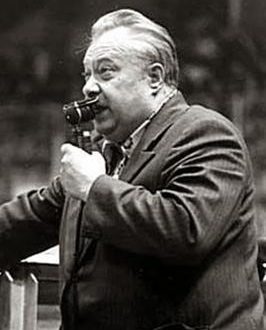
Zurab Andzshaparidze |
Zurab Andzshaparidze

The name of the legendary Georgian tenor Zurab Anjaparidze is inscribed in golden letters in the history of the national musical theater. Unfortunately, we are celebrating the current anniversary of the outstanding master, one of the best Germans and Radames of the Soviet opera scene, without him – six years ago, the famous artist died. But the memory of the “Soviet Franco Corelli” (as the Italian press dubbed him in his time) is still alive today – in the memoirs of his colleagues, enthusiastic admirers of talent, in the audio recordings of Russian, Italian and Georgian operas.
Glancing over the fate of this outstanding person, you are surprised at how much he managed to do in his, in fact, not so long century, and you understand how active, energetic and purposeful he was. And at the same time, you realize that there could have been even more stellar premieres, tours, interesting meetings in his life, if not for human envy and meanness, which unfortunately met on his way more than once. Anjaparidze, on the other hand, was proud and ardent in a Caucasian way – probably because his heroes were so sincere and exciting, and at the same time he himself was so inconvenient: he did not know how to choose patrons in high offices, he was not “smart” enough – “against whom make friends” in the theater… And, nevertheless, of course, the singer’s stellar career took place, took place despite all the intrigues – by right, by merit.
Most of his creative activity is connected with his native Georgia, for the development of the musical culture of which he managed to do a lot. However, undoubtedly, the most striking, fruitful and significant for the artist himself, and for the musical culture of our once common great country, was the period of his work in Moscow, at the Bolshoi Theater of the USSR.
A native of Kutaisi and a graduate of the Tbilisi Conservatory (class of David Andguladze, a famous teacher, and in the past the leading tenor of the Tbilisi Opera) came to conquer the capital of the Soviet Union, having in his luggage, in addition to a beautiful voice and a solid vocal education, seven seasons on the stage of the Tbilisi Opera House, where during this time Anjaparidze had a chance to sing many leading tenor parts. It was a really good base, because the Tbilisi Opera at that time was one of the five best opera houses in the USSR, famous masters have long sung on this stage. In general, it should be noted that opera in Tbilisi, in Georgia, has found fertile ground – this Italian invention has been firmly rooted in Georgian soil since the mid-nineteenth century, thanks, firstly, to the deep singing traditions that have existed in the country since time immemorial, and secondly, the activities of Italian and Russian private opera companies and individual guest performers who actively promoted classical music in the Transcaucasus.
The first theater in the country at the end of the fifties was in great need of tenors of dramatic and mezzo-characteristic roles. Immediately after the war, Nikolai Ozerov, a brilliant interpreter of the lyrical and dramatic repertoire, left the stage. In 1954, the long-term performer of the bloodiest tenor parts, Nikandr Khanaev, sang his Herman for the last time. In 1957, the famous Georgy Nelepp died suddenly, who at that time was in the prime of his creative powers and naturally drew the lion’s share of the theater’s tenor repertoire. And although the tenor group included such recognized masters as, for example, Grigory Bolshakov or Vladimir Ivanovsky, it undoubtedly needed reinforcements.
Arriving at the theater in 1959, Anjaparidze remained the “number one” tenor at the Bolshoi until his departure in 1970. An unusually beautiful voice, a bright stage appearance, a fiery temperament – all this immediately not only promoted him to the ranks of the first, but made him the only and inimitable ruler of the tenor Olympus. He was willingly introduced by theater directors into the most important and desirable performances for any vocalist – Carmen, Aida, Rigoletto, La Traviata, Boris Godunov, Iolanthe. Participated in the most significant theater premieres of those years, such as Faust, Don Carlos or The Queen of Spades. His constant partners on the Moscow stage are the great Russian singers, then also just beginning their careers of his peers – Irina Arkhipova, Galina Vishnevskaya, Tamara Milashkina. As befits a singer of the first position (whether this is good or bad is a big question, but one way or another such a practice exists in many countries), Anjaparidze sang mainly classical operas of the Italian and Russian repertoire – that is, the most popular, box office works. However, it seems that such a choice was made not so much for opportunistic considerations and not only due to the prevailing circumstances. Anjaparidze was best at romantic heroes – sincere, passionate. In addition, the “Italian” manner of singing itself, the classical voice in the best sense of the word, predetermined this repertoire for the singer. The pinnacle of his Italian repertoire was rightfully recognized by many as Radamès from Verdi’s Aida. “The singer’s voice flows freely and powerfully, both in solo and in extended ensembles. Excellent external data, charm, masculinity, sincerity of feelings are the best fit for the stage image of the character, ”such lines can be read in reviews of those years. Indeed, Moscow has never seen such a brilliant Radames either before or after Anjaparidze. His manly voice with a sonorous, full-blooded, vibrating upper register, nevertheless, had a lot of lyrical sound in its sound, allowing the singer to create a multifaceted image, widely use an extensive palette of vocal colors from soft poetry to rich drama. Add to the fact that the artist was simply handsome, had a bright, expressive southern appearance, which was most suitable for the image of an ardent Egyptian in love. Such a perfect Radames, of course, perfectly fit into the grandiose production of the Bolshoi Theater in 1951, which was on its stage for more than thirty years (the last performance took place in 1983) and which many consider to be one of the best works in the history of the Moscow Opera.
But the most significant work of Anjaparidze in the Moscow period, which brought him worldwide recognition, was the part of Herman from The Queen of Spades. It was after performing in this opera during the tour of the Bolshoi Theater at La Scala in 1964 that the Italian press wrote: “Zurab Anjaparidze was a discovery for the Milanese public. This is a singer with a strong, sonorous and even voice, capable of giving odds to the most revered singers of the Italian opera scene. What attracted him so much in his interpretation of the famous hero of Pushkin and Tchaikovsky, in fact, so far from the romantic pathos of Italian opera, where every note, every musical phrase breathes Dostoevsky’s eerie realism? It would seem that a hero of such a plan is simply contraindicated for the “Italian” tenor Anjaparidze, and the singer’s Russian language, frankly, is not flawless. and prudent German, Andzhaparidze endowed this hero with Italian passion and romanticism. It was unusual for music lovers to hear in this part not a specifically Russian voice, but a luxurious “Italian” tenor – a hot and exciting ear for everyone, regardless of what he sings. But for some reason, we, who are familiar with many excellent interpretations of this part both in Russia and abroad, continue to worry about this performance years later. Maybe because Anjaparidze managed to make his hero, in addition to other advantages, not a textbook, but a really living, real person. You never cease to be surprised at the crushing flow of energy that rages from a vinyl record (recording by B. Khaikin) or a soundtrack for a 1960 film (directed by R. Tikhomirov). They say that Placido Domingo quite recently, in the late 1990s, on the advice of Sergei Leiferkus, made his Herman from that same, already legendary film, where the musical hero Anjaparidze was “dramatically” revived by the unsurpassed Oleg Strizhenov (that rare case when breeding in the film – the opera of the singer and the dramatic actor did not harm the dramaturgy of the work, which, apparently, affected the genius of both performers). It seems that this is really a good role model, and the great Spaniard was able to appreciate the phenomenal, one-of-a-kind Georgian tenor Herman.
Anjaparidze’s departure from the Bolshoi was swift. In 1970, during the theater’s Paris tour, at the suggestion of the singer’s ill-wishers – his own colleagues in the troupe, offensive hints appeared in French newspapers that the actor’s appearance did not correspond to the images of young romantic heroes that he embodied on stage. In fairness, it must be said that the problem of excess weight really existed, but it is also known that this did not interfere with the perception of the audience of the image that the singer could create on stage, such an image that even despite his overweight build, Anjaparidze was surprisingly plastic, and few people noticed his extra pounds. Nevertheless, for a proud Georgian, such disrespect was enough to leave the leading Soviet opera company without regret and return home to Tbilisi. Almost thirty years that passed from those events until the death of the artist showed that both Anjaparidze and Bolshoy lost from that quarrel. In fact, the year 1970 ended the short international career of the singer, which had begun so brilliantly. The theater has lost an excellent tenor, an active, energetic person, not indifferent to other people’s troubles and destinies. It’s no secret that the Georgian vocalists who later sang on the stage of the Bolshoi received a “start in life” from Anjaparidze – Makvala Kasrashvili, Zurab Sotkilava, and the current “Italian” prime minister of the Bolshoi Badri Maisuradze.
In his homeland, Anjaparidze sang a lot at the Tbilisi Opera with the most diverse repertoire, paying a lot of attention to national operas – Paliashvili’s Abesalom and Eteri, Latavra, Taktakishvili’s Mindia and others. According to his daughter, the famous pianist Eteri Anjaparidze, “the administrative position did not really attract him, since all the subordinates were his friends, and it was embarrassing for him to“ direct ”among his friends.” Anjaparidze was also engaged in teaching – first as a professor at the Tbilisi Conservatory, and later headed the Department of Musical Theater at the Theater Institute.
The memory of Zurab Anjaparidze is being honored in the homeland of the singer. On the fifth anniversary of the artist’s death, a bronze bust by the sculptor Otar Parulava was erected on his grave in the square of the Tbilisi Opera House, next to the graves of two other luminaries of Georgian opera music, Zakharia Paliashvili and Vano Sarajishvili. A couple of years ago, a foundation named after him was established, headed by the singer’s widow Manana. Today we in Russia are also remembering a great artist, whose colossal contribution to both Georgian and Russian musical culture has not yet been fully appreciated.
A. Matusevich, 2003 (operanews.ru)





